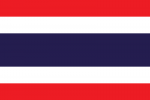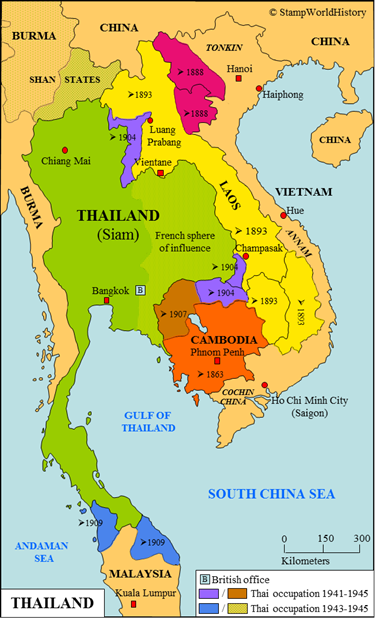ประเทศไทย

Thailand
Quick reference
General issues: Kingdom of Siam 1883-1939, Kingdom of Thailand 1939-1945, Kingdom of Siam 1945-1949, Kingdom of Thailand 1949-Present
Country name on general issues: Siam in Thai script, Siam, Thai, Thailand
Special issues: Straits Settlements office Bangkok 1882-1886, Thai occupation Malayan states 1943-1945
Currency: 1 Baht (Tical) = 4 Shalung, 1 Shalung = 4 Sik = 8 Sio = 16 Atts = 32 Solot 1883-1909, 1 Baht (Tical) = 100 Satangs 1909-Present
Population: 6 320 000 in 1900, 67 010 000 in 2013
Political history Thailand
Thailand is a kingdom located in southeastern Asia. Thailand is called Siam until 1939 and again from 1945 until 1949. Thailand is, in the 19th century, faced with the colonial ambitions from both France and Great Britain in Southeastern Asia. France, initially, aims to acquire all of Thailand as a French colony. This meets with British opposition. Still, Thailand has to cede large territories under its sovereignty to the French.
In 1863, the king of Cambodia – until then a tributary of Thailand – requests French protection, Cambodia thus becoming a French protectorate. Thailand, in 1867, relinquishes its claims on Cambodia. In 1888, the French extend their territory from Tonkin – part of the empire of Vietnam and a French protectorate – at the expense of Thailand. The Franco-Siamese war of 1893 ends in Thailand ceding further territories to France, that combines the territories to form the protectorate of Laos. Finally, territory is ceded to Cambodia and Laos in 1904 and 1907 thus establishing the borders as we know them today.
In the mean time, the British – who have supported Thailand against all out French colonization – demand compensation. In 1893, Thailand relinquishes its claims on the Shan states in Burma. In 1909, the British acquire four Malayan sultanates as protectorates that, until then, were tributaries of Thailand: Kedah, Kelantan, Perlis and Trengganu.
Eventually, the French and the British agree to have Thailand as a buffer state between their respective spheres of influence in southeastern Asia. Thus, Thailand will be – although it has ceded large parts of its territory – the only country in southeastern Asia to remain independent during the colonial era.
During WWII, Thailand temporarily regains some of the lost territories. After the German invasion of France, in 1941, Thailand declares war on France and successfully reoccupies the territories lost to Cambodia and Laos in 1904 and 1907. When Japan enters the war, Thailand sides with Japan. In the wake of the Japanese advance, Thailand occupies part of the Shan states in Burma in 1943. To the south, Japan transfers the administration of the Malayan states that formerly were tributaries to Thailand – Kedah, Kelantan, Perlis and Trengganu – to Thailand from 1943 to 1945. After the Japanese capitulation, all the territories revert to France and Great Britain respectively.
Thailand, until 1932, has been an absolute monarchy. In 1932, Thailand becomes a constitutional monarchy. The military in Thailand, however, are a powerful political force, and Thailand to date has known both periods of democracy and military dictatorship. After WWII, Thailand and the United States develop close ties to ward of the advance of communism in southeastern Asia. The Thai economy is strong, ranking among the top 25 economies in the world.
Postal history Thailand
Thailand has issued stamps since 1883. These are initially for domestic use, and also, from 1885 – when Thailand joins the UPU – for international use. Until 1910, many stamps are overprinted with new face values, these being local overprints existing in many varieties.
From 1858, a British consular post office functioned in Bangkok. Stamps from Hong Kong are known to be used in this office. The Straits Settlements have an office in Bangkok from 1882 until 1886 that is also used for Thai international mail. The office is closed when Thailand joined the UPU. Stamps from the Settlements, overprinted ‘B’, are used in Bangkok.
During WWII, Thailand issues a set of stamps for use in the occupied Malayan states.[1]Michel lists a second set, printed locally in Kota Bharu, in the sultanate of Kelantan.
Album pages
← Previous page: TajikistanNext page: Tibet →





